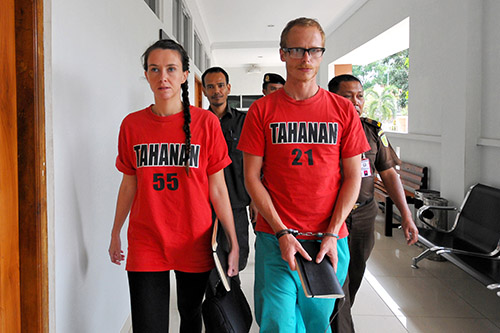Two British filmmakers on trial in Indonesia over visa regulations
| Publisher | Committee to Protect Journalists |
| Publication Date | 22 October 2015 |
| Cite as | Committee to Protect Journalists, Two British filmmakers on trial in Indonesia over visa regulations, 22 October 2015, available at: https://www.refworld.org/docid/567276f115.html [accessed 5 June 2023] |
| Disclaimer | This is not a UNHCR publication. UNHCR is not responsible for, nor does it necessarily endorse, its content. Any views expressed are solely those of the author or publisher and do not necessarily reflect those of UNHCR, the United Nations or its Member States. |
New York, October 22, 2015 – The Committee to Protect Journalists is concerned by the continued detention and trial of two British filmmakers who have been held in Indonesia since May 28. They are being held with the general prison population in a provincial jail in Batam, according to family members.
 Neil Bonner and Rebecca Prosser are escorted into court in Indonesia on October 22. The British filmmakers are on trial for working without a journalist visa. (AFP/Iklil Faiz)
Neil Bonner and Rebecca Prosser are escorted into court in Indonesia on October 22. The British filmmakers are on trial for working without a journalist visa. (AFP/Iklil Faiz)
Neil Bonner and Rebecca Prosser were arrested by the Indonesian navy off the western island of Batam and charged with working on tourist visas, instead of journalist visas, according to the English-language daily Jakarta Post. When the filmmakers appeared at Batam district court today, the prosecutor called for them to be jailed for five months and fined 50 million Indonesian rupiah ($3,700) each, the AFP reported. Under Article 112 of Law No. 6/2011 on Immigration, the charge carries a maximum sentence of five years imprisonment and a 500 million Indonesian rupiah fine, the Jakarta Post said.
Bonner and Prosser had been making a documentary about piracy in Southeast Asia for the London-based production company Wall to Wall at the time of their arrest, the company told CPJ in a phone call. Batam is south of Singapore near the Strait of Malacca, which is an important international shipping lane and is plagued by piracy, according to the International Maritime Bureau. Prosser's family told CPJ the filmmakers are cooperating with prosecutors. The family added that the filmmakers' legal team has argued that the case is an administrative matter, not a criminal one.
"Indonesia has a history of using visa restrictions to obstruct journalists who seek to cover stories on international importance within its borders. Prolonged pre-trial investigations and trials stretched out over weeks are heavy handed methods of addressing immigration violations," said Bob Dietz, CPJ's Asia program coordinator. "Neil Bonner and Rebecca Prosser are not common criminals and should not be treated as such."
Nine Indonesian assistants arrested alongside Bonner and Prosser were released shortly after being arrested in May, local media reported. The assistants were told they could still face trial for helping to film the documentary, according to Indonesian media reports. The group had been reenacting a piracy scene when they were arrested, the reports said.
Despite the government promising to ease visa restrictions on foreign media when President Joko Widodo assumed office in October 2014, international journalists who want to report in Indonesia still need to apply for a special visa which can take weeks to be issued and can be denied. In previous cases CPJ has documented, international journalists detained without a press visa or official permits have been quickly deported.
At the request of their families, CPJ and many news outlets have not previously reported on the detention of Bonner and Prosser while the filmmakers' families worked with local lawyers to gain the pair's release. CPJ is releasing this statement with their approval.
EDITOR'S NOTE: The third paragraph has been updated to reflect that the filmmakers' legal team has argued that the case is an administrative matter, not a criminal one.
